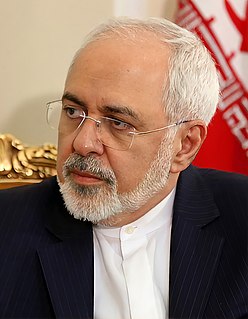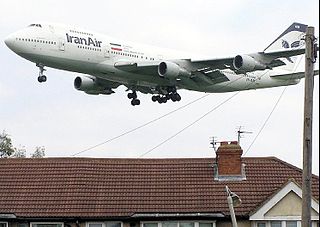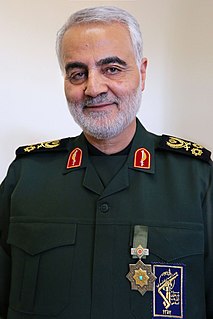
Iran and the United States have had no formal diplomatic relations since April 1980. Pakistan serves as Iran's protecting power in the United States, while Switzerland serves as the United States' protecting power in Iran. Contacts are carried out through the Iranian Interests Section of the Pakistani Embassy in Washington, D.C., and the US Interests Section of the Swiss Embassy in Tehran. In August 2018, Supreme Leader of Iran Ali Khamenei banned direct talks with the United States.

Mohammad Javad Zarif is an Iranian career diplomat and academic. He has been foreign minister of Iran since 2013. During his tenure as foreign minister, he led the Iranian negotiation with P5+1 countries which produced the Joint Comprehensive Plan of Action on 14 July 2015, lifting the economic sanctions against Iran on 16 January 2016. On 25 February 2019, Zarif resigned from his post as foreign minister. His resignation was rejected by Supreme Leader Ali Khamenei and he continues as foreign minister.

The United States has since 1979 applied various economic, trade, scientific and military sanctions against Iran. U.S. economic sanctions are administered by the Office of Foreign Assets Control (OFAC), an agency of the US Treasury Department. Currently, US sanctions against Iran include an embargo on dealings with the country by the U.S., and a ban on selling aircraft and repair parts to Iranian aviation companies.

Qasem Soleimani was an Iranian military officer who served in the Islamic Revolutionary Guard Corps (IRGC). From 1998 until his death in 2020, he was the commander of the Quds Force, an IRGC division primarily responsible for extraterritorial and clandestine military operations. In his later years, he was considered by some analysts to be the right-hand man of the Supreme Leader of Iran, Ali Khamenei, as well as the second-most powerful person in Iran behind him.

Amir Mirza Hekmati ; is a former United States Marine who was arrested in August 2011 for allegedly spying for the CIA in Iran. On January 9, 2012, he was sentenced to death for the charges. On March 5, 2012, the Iranian Supreme Court overturned the death sentence and ordered a retrial, saying the verdict against Hekmati was "not complete". On January 16, 2016, Hekmati was released and allowed to leave Iran as part of a prisoner trade between the U.S. and Iran. He returned to the United States on January 21, 2016. He sued the Government of Iran on May 11, 2016. He received a default judgment of $63 million on October 3, 2017. In November 2019 he sued the government for unpaid compensation. According to the assistant attorney general they are reconsidering if he is eligible.
Saeed Abedini is an Iranian American Christian pastor who was imprisoned in Iran in 2012 based on allegations that he compromised national security. During his imprisonment, Abedini became internationally known as a victim of religious persecution. Following international pressure, Abedini was released from prison on 16 January 2016 along with other American prisoners.

The Joint Comprehensive Plan of Action, known commonly as the Iran nuclear deal or Iran deal, is an agreement on the Iranian nuclear program reached in Vienna on 14 July 2015, between Iran and the P5+1 together with the European Union.

Jason Rezaian is an Iranian-American journalist who served as Tehran bureau chief for The Washington Post. He was convicted of espionage in a closed-door trial in Iran in 2015.

Nizar Zakka is a Lebanese national who was arrested by Iran in 2015, and was imprisoned until 2019 on charges of espionage for the United States. Zakka worked as an Internet freedom advocate and served as secretary general of the Arab Information and Communications Technology (ICT) Organization (IJMA3) in Washington, D.C., and is a US permanent resident.

Nazanin Zaghari-Ratcliffe is an Iranian-British dual citizen who has been detained in Iran since 3 April 2016. In early September 2016, she was sentenced to five years' imprisonment after being found guilty of "plotting to topple the Iranian government". She was temporarily released on 17 March 2020 during the COVID-19 pandemic in Iran, while being monitored.

Xiyue Wang is a Chinese-American graduate student who was imprisoned in Iran from 2016 to 2019 after being accused of espionage.
The Treaty of Amity, Economic Relations and Consular Rights between the United States and Iran was signed in Tehran on August 15, 1955, received the consent of the Senate on July 11, 1956 and entered into force on 16 June 1957. The treaty is registered by the United States to the United Nations on 20 December 1957. The official texts are in English and Persian. It is sealed by plenipotentiaries Selden Chapin (U.S.) and Mostafa Samiy (Iran).

Alleged Violations of the 1955 Treaty of Amity, Economic Relations, and Consular Rights is the formal name of a case in the International Court of Justice (ICJ). Iran filed a lawsuit with the Hague-based ICJ against the United States, on 16 July 2018, mainly based on the 1955 Treaty of Amity signed between the two sides, well before the Islamic revolution of Iran. Iranian officials said that US re-imposition of the nuclear sanctions was a violation of the treaty. At the time, the United States regarded the lawsuit as "baseless" and vowed to fight against it. Almost a month later, the case was heard by the ICJ within a week and the US was asked by the court's president to "respect the outcome."

The Joint Comprehensive Plan of Action, known commonly as the Iran nuclear deal or Iran deal, is an agreement on the Iranian nuclear program reached in Vienna on 14 July 2015 between Iran, the P5+1, and the European Union. The nuclear deal received a mixed international reaction, with many countries expressing praise or hope it could achieve the denuclearization of Iran. Some of Iran's neighbouring countries and U.S. lawmakers expressed skepticism about the agreement, seeing it as critically flawed.

The Joint Comprehensive Plan of Action, commonly known as the Iran nuclear deal or Iran deal, is an agreement on the Iranian nuclear program reached in Vienna on 14 July 2015 between Iran, the P5+1, and the European Union.

The 2019–2021 Persian Gulf crisis is the ongoing state of heightened military tensions between the Islamic Republic of Iran and its allies and the United States of America and its allies in the Persian Gulf region. Starting in early May 2019, the U.S. began a buildup of its military presence in the region to deter an alleged planned campaign by Iran and its non-state allies to attack American forces and interests in the Persian Gulf and Iraq. This followed a rise in political tensions between the two countries during the Trump administration, which included the withdrawal of the U.S. from the Joint Comprehensive Plan of Action (JCPOA), the imposition of new sanctions against Iran, and the designation of the Islamic Revolutionary Guard Corps (IRGC) as a terrorist organization. In response, Iran designated the United States Central Command as a terrorist organization.

Ana Diamond, previously a dual citizen of Iran and Finland, now a British political commentator, researcher and human rights activist who is one of the founding members of The Alliance Against State Hostage Taking. The organisation was formally founded in New York on 24th September 2019, on the sideline of the United Nations General Assembly, the first global entity of its kind. She currently holds British and Finnish citizenships.

Masoud Soleimani is an Iranian who was imprisoned in the United States on October 25, 2018 charged with attempting to export biological materials from the US to Iran without authorization without bail and held in prison until his release from custody in a prisoner swap on December 11, 2019 against Xiyue Wang. Masoud Soleimani was invited by the Mayo Clinic in Minnesota to lead a research program. Upon his arrival in the United States, he was arrested and transferred to a prison in Atlanta.

The assassination of Qasem Soleimani, an Iranian major general, took place on 3 January 2020 when the United States launched a drone strike at Baghdad International Airport that targeted and killed Soleimani while purportedly on his way to meet Iraqi Prime Minister Adil Abdul-Mahdi in Baghdad. Soleimani was commander of the Quds Force, one of five branches of Iran's Islamic Revolutionary Guard Corps (IRGC), and was considered the second most powerful person of Iran, subordinate to Supreme Leader Ali Khamenei. Five Iraqi nationals and four other Iranian nationals were killed alongside Soleimani, including the deputy chairman of Iraq's Popular Mobilization Forces (PMF) and commander of the Iran-backed Kata'ib Hezbollah militia, Abu Mahdi al-Muhandis – a person designated as a terrorist by the U.S. and the United Arab Emirates (UAE).

On 8 January 2020, in a military operation code named Operation Martyr Soleimani, Iran's Islamic Revolutionary Guard Corps (IRGC) launched numerous ballistic missiles at the Ayn al-Asad airbase in Al Anbar Governorate, western Iraq, as well as another airbase in Erbil, in the Kurdistan Region, in response to the killing of Major General Qasem Soleimani by a United States drone strike. While the U.S. initially assessed that none of its service members were injured or killed, the U.S. Department of Defense ultimately said that 110 service members had been diagnosed and treated for traumatic brain injuries from the attack, however none died due to early warning provided by the United States Space Force.
















